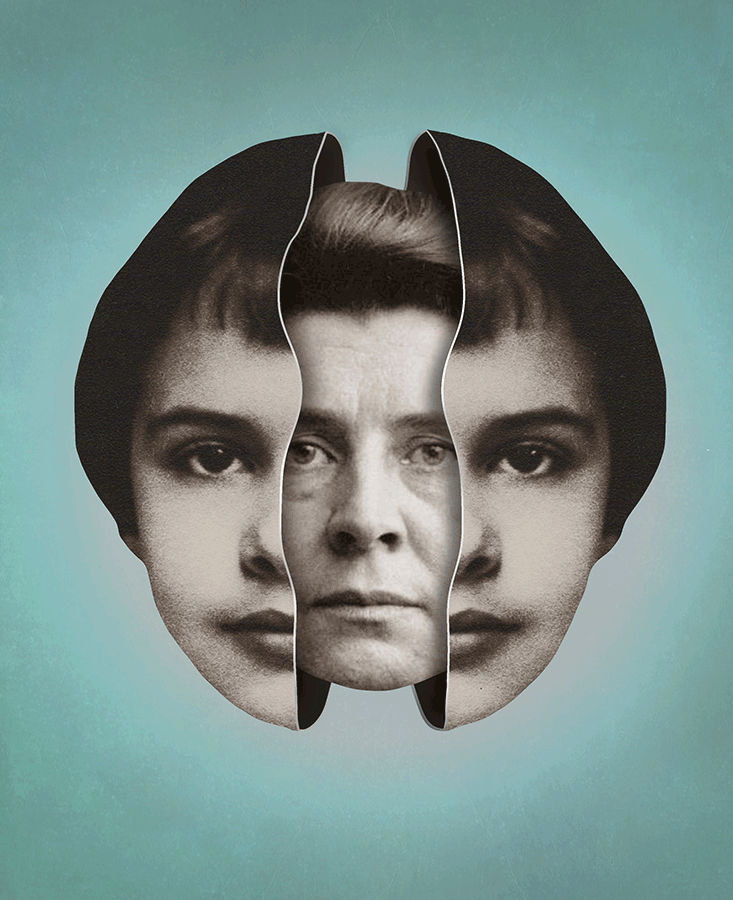At the 2010 Cannes Film Festival premiere of You Will Meet A Tall Dark Stranger, director Woody Allen was asked about aging. He replied with his characteristic, straight-faced pessimism. “I find it a lousy deal. There is no advantage in getting older. I’m 74 now. You don’t get smarter, you don’t get wiser … Your back hurts more, you get more indigestion … It’s a bad business, getting old. I’d advise you not to do it if you can avoid it.”
Creaking bones and bad digestion notwithstanding, is that really the only face of aging? Turns out, it’s not. At least for the fortunate few, old age may not be Woody Allenesque; instead old age is when they become compassionate and wise. Yes, wise.

While aging diminishes activity in certain brain regions, there’s tantalizing evidence this may be compensated by changes in brain regions associated with supportive and social behavior. This shift in brain activity may foster wisdom in some people, a way of being that moves one away from self-centeredness toward emotional equanimity and wider social consciousness. We may even be able to work toward wisdom in old age.
For millennia, philosophers and theologians have been preoccupied with the notion of wisdom (the Greek word philosophia means “love of wisdom”). Centuries before the Greeks got into the act, the religious traditions of India and China, such as Hinduism, Buddhism, and Daoism, were thinking about wisdom, emphasizing the regulation of emotion—or emotional balance—as key to it.
Aristotle delineated wisdom into two types. One was the general, god-like, all-knowing wisdom, and the second (more pertinent to us mere mortals) was something called phronesis, or practical wisdom, which is the ability to be discerning about one’s actions, knowing when and why to act in a pragmatic manner. Ideally, such wise actions—whether involving emotion regulation or reasoning—would balance self-interest against the interests of others and those of society in general.
Despite humanity’s fascination with wisdom, it wasn’t until about four decades ago that it became a topic of empirical study. Vivian Clayton, who practices geriatric neuropsychology in Orinda, California, was a graduate student in the 1970s when she began to seriously think about operationalizing, or defining and measuring, wisdom. Her study of both ancient and modern literature led her to define wisdom as judicious behavior, often involving social situations—behavior born of knowledge, imbued with thoughtfulness, reflection, and compassion.
Wisdom comes from a balance of activity in brain regions.
By the 1980s, other psychologists got into the act. Swiss psychologist Jean Piaget, in the 1930s, had put forth an influential model of cognitive development, the final stage of which endowed us with the ability for abstract thought. Piaget saw this stage as the height of cognitive development, the highest form of reasoning one can achieve. But Woody Allen’s bemoaning aside, is this the pinnacle of human ability? Psychologists speculated that there was more: the “more” being wisdom that came with life experience, and was potentially associated with getting older.
Such questions led German psychologist Paul Baltes, along with psychologist Ursula Staudinger, to start the Berlin Wisdom Project in the 1980s—a pioneering effort to pin down wisdom. “It was an interest in this notion of wisdom [as] an ideal endpoint of human development,” says Staudinger, who today is the director of the Robert N. Butler Columbia Aging Center, at Columbia University.
Baltes and Staudinger defined wisdom as “expertise involving deep insight and sound judgment about the essence of the human condition and the ways and means of planning, managing, and understanding a good life.”
Intuitively, the ability to be wise seems as if it should grow with age, but their research showed that it’s not enough to get older to get wiser. Other processes that come with aging could hamper the emergence of wisdom. Aging diminishes what Baltes and
Staudinger called the “mechanics” of the mind—which depend on the biology of the brain, such as the number of neurons, the connectivity, metabolism, and the speed at which the brain can process new information. The mechanics of the mind reach their peak around the age of 25 to 30, and then decline steadily.
Many studies have shown that the aging brain gets slower. For instance, the ability to carry out mental operations definitely declines. As does our capacity for episodic memory and executive function (which is necessary for planning, multitasking, and verbal fluency, among other tasks), due to dysfunctions in the medial temporal lobe memory system and the frontostriatal networks, important for executive function.

But all’s not lost. “What doesn’t go down is reasoning and cognition that is based on knowledge and experience,” says Staudinger. This ability, which reaches its peak between the ages of 40 and 50, and then stays stable and declines only during the final years of one’s life, could contribute to wisdom, as long as we stay mentally active and engaged. Evidence from studies of rhesus monkeys supports this observation. This involves structures called dendritic spines, which protrude from one neuron’s dendrite toward another neuron’s axon. These spines have a neck and a head. Those with long necks and small heads decline with age, but the shorter, stubbier “mushroom spines,” hypothesized to be “locus of long-term memories,” don’t decline. That potentially explains why our ability to learn new things suffers as we age, yet abilities that depend on lifelong learning (such as playing a musical instrument) don’t.
Following Baltes’ death in 2006, Staudinger has come to differentiate between so-called general and personal wisdom. She has found that while general wisdom—the ability to make wise decisions about others—stays more or less stable over one’s lifespan, it’s much harder to be wise about one’s own life. Personal wisdom is not easy.
Nothing illustrates this more than the story of King Solomon of Israel, whom both Christians and Jews regard as an exemplar of wisdom. When two women came to him with a baby, each claiming the baby was hers, Solomon suggested cutting the baby in half. When one woman cried out that the baby should be spared and given to the other woman, Solomon identified her as the real mother. Solomon demonstrated general wisdom. “At the same time, Solomon had a private life that was completely unwise,” says Staudinger.
There may be a specific neurocircuitry of wisdom.
Igor Grossmann, who studies wisdom at the University of Waterloo in Ontario, Canada, thinks that the ability to be wise about one’s own life has a lot to do with one’s sense of self. “In Western culture, there is this idea that the self is kind of an independent entity, that everybody has a very clear-cut independently-defined concept of who he or she may be,” says Grossmann.
And that often makes a person vulnerable. “What you find is that if you put people in a situation where their self is threatened, then people are not very good in engaging in any form of wise reasoning. They want to quickly defend their self,” says Grossmann.
Grossmann’s cross-cultural studies have revealed that in cultures where the self is seen as more interdependent, more reliant on relationships with other people—such as in Japan—people are less threatened by perceived dangers to one’s self, and are more able to engage in wise reasoning.
But studies show that even for those of us who take offense easily, it’s possible to boost the ability to reason wisely by creating some distance between you and, well, your self. Clinical psychologists call this process decentering: You take an observer’s view of something that’s happening rather than being a participant.
Grossmann says that loosening the hold of the self can help with wise reasoning, even as we age. One way to decenter as you age is to live in an interdependent manner, surrounded by people, so that you don’t feel alone and threatened.
“Old age is not necessarily a time when everything declines,” says Grossmann. “Many of these types of processes are flexible, and you can train them.” Via meditation, for example. “Many of the meditative practices include this type of third-person perspective, where you detach from the immediate self, you become an observer,” says Grossman.
There’s plenty of evidence that meditation induces neurobiological changes. Sara Lazar’s lab at the Harvard Medical School in Boston has shown that even eight weeks of meditation can increase gray matter density in brain regions associated with executive function, working memory, and—importantly, from the perspective of wisdom—empathy, compassion, and self-distancing. In another study, her team showed that certain regions of the prefrontal cortex were as thick in 40- to 50-year-old meditators as they were in 20- to 30-year-old meditators and control subjects.
The brain’s prefrontal cortex especially interests Dilip Jeste, a former president of the American Psychiatric Association and director of the Sam and Rose Stein Institute for Research on Aging at the University of California, San Diego. He speculates that it may be part of a network of brain regions responsible for wisdom.
To understand wisdom and its possible neurobiological underpinnings, Jeste and his colleagues took a multipronged approach. The first was an extensive literature survey, to identify what researchers mean by wisdom. Second, they put together a panel of experts, and canvassed their opinions on a list of traits. (Jeste considers wisdom a personality trait; not everyone does.) The experts responded anonymously, tagging each trait as necessary for wisdom, intelligence, or spirituality—a trait could belong to one, two, all three, or none of them. Each expert was then sent the panel’s average response, and the process was repeated. “It was clear that the experts viewed these three as slightly overlapping, but largely independent concepts,” says Jeste. For example, “wise people are intelligent, but intelligent people are not necessarily wise.”
The researchers went further. They interviewed hospice care patients, who were nearing the end of their lives, about what they thought about wisdom. Finally, they addressed an issue that confounds wisdom research: cultural specificity. With help from a medical anthropologist and some special software, Jeste analyzed The Bhagavad Gita, a spiritual treatise that is considered the philosophical cornerstone of Hinduism, dating back to the last few centuries B.C. “We looked at wisdom and its synonyms, like sagacity, and antonyms, like foolishness, folly,” says Jeste. “We wanted to find out how many times those words were used and more importantly in what context in the Gita.”
Their analysis was revealing. “What was really striking and surprising was that the components of wisdom looked at in these different ways are surprisingly similar,” Jeste says.
The team identified six components of wisdom: having pragmatic knowledge of life; emotion regulation; pro-social behavior, which would entail compassion, altruism, and empathy; knowing one’s strengths and limitations; decisiveness; and finally, acceptance of uncertainty.

More striking was the consistency over time. “Why should the concept of wisdom not have changed from thousands of years B.C. to today?” says Jeste. “To me it suggested that it should be biologically based. If it is biologically based, then where would it be based? Obviously in the brain, but where in the brain?”
Jeste’s team went back to the literature. They looked at studies on brain imaging, genetics, neurochemistry, and neuropathology that targeted these individual components of wisdom, and their opposites; for example, the opposite of emotion regulation is impulsivity, and the opposite of pro-social behavior can be found in the actions of anti-social personalities.
Case reports of patients with brain damage, either due to injury or strokes, were enlightening. Jeste recalls reading the published case of an intelligent young soldier in his 20s, competent, well-adjusted, and happily married. One day the Jeep he was riding in went over a landmine. The resulting brain injury transformed his personality. He would divorce and remarry—three times. He barely managed to hold down a job as a newspaper delivery man. The damage to his brain was localized to the prefrontal cortex.
Further clues emerged from a form of neurodegenerative disease called behavioral frontotemporal dementia (bvFTD), in which the damage is again restricted more or less to the prefrontal cortex. People suffering from bvFTD often start making bad decisions, show lack of insight, become impulsive, passionate, and sometimes anti-social. “If you look at the symptoms, they are the exact antithesis of wisdom,” says Jeste.
In a recent retrospective study of 2,397 patients seen at the Memory and Aging Center at the University of California, San Francisco, researchers found that those diagnosed with bvFTD were far more likely to engage in criminal behavior compared with those suffering from Alzheimer’s disease (AD). “Common manifestations of criminal behavior in the bvFTD group included theft, traffic violations, sexual advances, trespassing, and public urination in contrast with those in the AD group, who commonly committed traffic violations, often related to cognitive impairment,” the researchers wrote.
For Jeste and colleagues, the evidence was enticing. “Based on all of those, we suggested there is a neuro-circuitry of wisdom,” says Jeste. This circuit involved the dorsolateral prefrontal cortex (responsible for rationality, discipline, and self-preservation), the ventromedial prefrontal cortex (associated with “kind, supportive, social, and emotional behavior needed for survival of species”), the anterior cingulate (which mediates conflicts between parts of the prefrontal cortex), and the striatum with amygdala (part of the reward circuitry).
When we are young we like our jokes to be bizarre.
According to Jeste, wisdom comes from a balance of activity in these brain regions. “In some way, wisdom is balance. If you are very pro-social, you give everything to other people, you won’t survive. But of course, if you don’t give anything to others, the species won’t survive. You have to have balance.”
Despite such evidence, Jeste is cautious. “It’d be unwise of us to say that this is the neuro-circuitry of wisdom,” he says. “We don’t know that. It is a hypothesis. Empirical research may show that it is totally wrong and something else is right. That’s fine.”
And what does this have to do with aging? Jeste points out that aging is associated with a shift in brain activity. For instance, there’s something called Hemispheric Asymmetry Reduction in Older Adults (HAROLD)—a phenomenon in which the half of the prefrontal cortex that is less active in youth (which half depends on the individual) shows increased activation during old age, increasing overall activity in the prefrontal cortex. There’s also a shift in activity during old age from the occipital lobes, which is associated with sensory processing, to the prefrontal cortex (the so-called posterior-anterior shift with aging).
None of this is to suggest that older people are wiser by default. “Wisdom and aging are not synonymous,” says Jeste. “You see young people who are very wise for their age and you see old people who are very unwise. Having said that, it’s more likely that with aging you can become wiser.”
But why? Jeste has often asked himself the same question. As we get older, we develop infirmities, diseases, and disabilities. “If we are supposed to live long with disabilities without contributing to the species, it doesn’t make sense, unless something improves with aging to compensate,” says Jeste. “The idea is that this is wisdom.”
Another association of old age with wisdom comes from studies of humor. Turns out that when we are young we like our jokes to be bizarre, incongruous. As we get older, we find jokes funnier if they don’t merely have incongruous punchlines but also have an overall coherence. “You could make a loose connection between that and perhaps wisdom, where if you think of wisdom as being more interested in how things fit together, and less interested in what is bizarre or different,” says neuropsychologist Hiram Brownell of Boston College.
Staudinger worries that we risk diluting the essence of wisdom by taking too broad a view. Sure, there are things we do better as we age, but she thinks that’s more to do with leading an adjusted, well-balanced life. It’s well known that older adults are better able to focus on positive emotions and avoid negative emotions—something that can be seen as wise. But according to Staudinger, that tells us that we are becoming more socially competent and well-adjusted as we age—but not necessarily wise.
Wisdom, says Staudinger, includes being able to handle negative emotions and “actually stick to the negative emotionality just long enough to learn from it, and not do away with it or avoid it altogether.” Often, she adds, “we really have to be exposing ourselves to very unpleasant states,” if we are to grow rather than adjust.
Staudinger and her colleagues have carried out over 1,200 “wisdom interviews” since the 1980s, of people ranging in age from 12 to 95. She thinks less than 1 percent of those interviewed displayed levels of insight and judgment necessary for wisdom according to her team’s definition—a capacity to tolerate negative emotions and learn from them, a penchant for thinking about the next generation and the common good over one’s immediate needs. “Very few people develop the ability to transcend their body, transcend their own self,” says Staudinger.
While it’s clear that our definition of wisdom makes it more or less likely that we’ll achieve that exalted state as we age, it’s also clear that those who do live wise lives benefit not just themselves but humanity itself.
Anil Ananthaswamy, an award-winning journalist, is a guest editor at the University of California at Santa Cruz’s science writing program. He is the author of The Edge of Physics, named Book of the Year 2010 by the United Kingdom’s Physics World and The Man Who Wasn’t There, nominated for the PEN/E.O. Wilson Literary Science Writing Award.



























